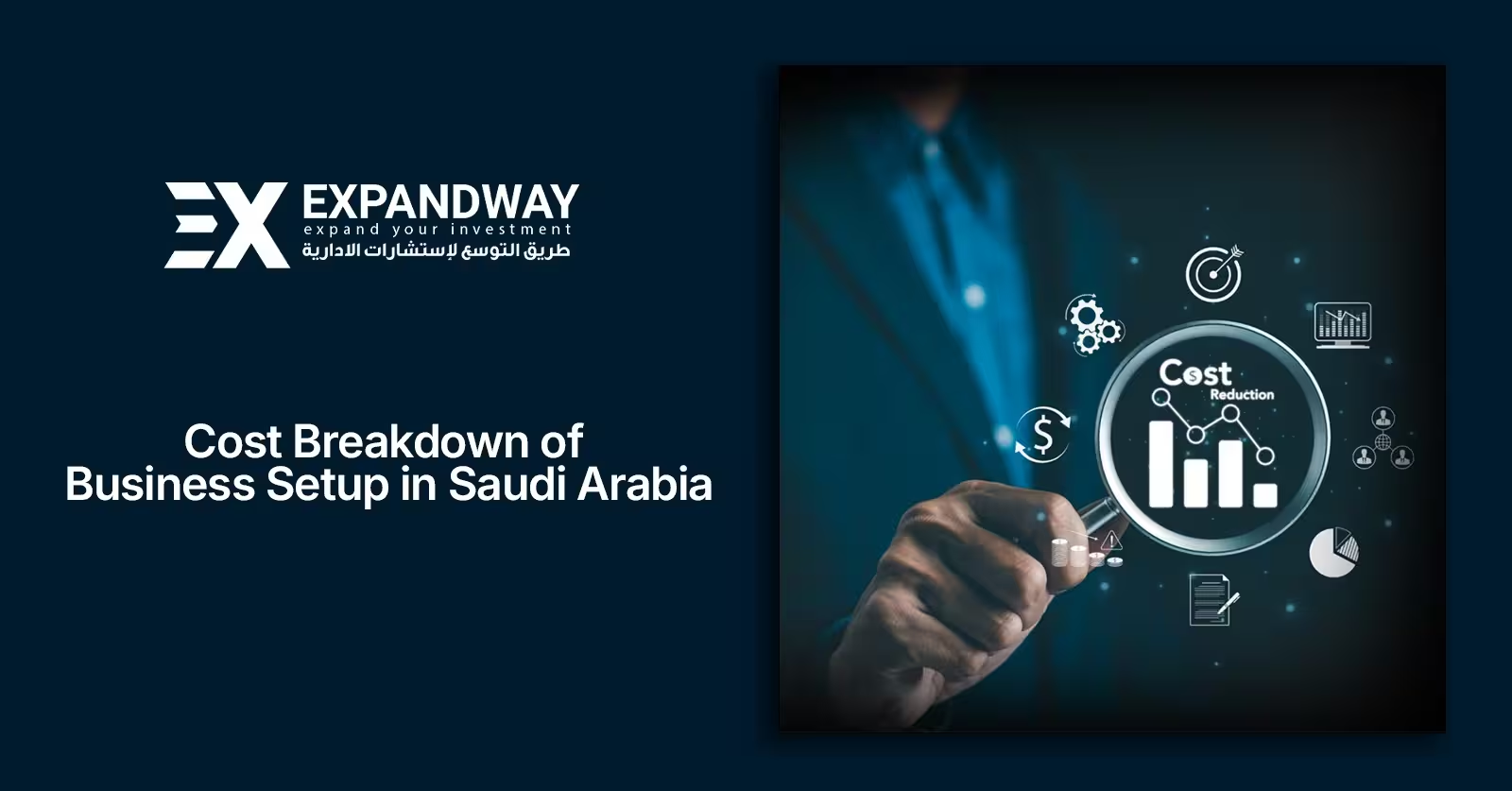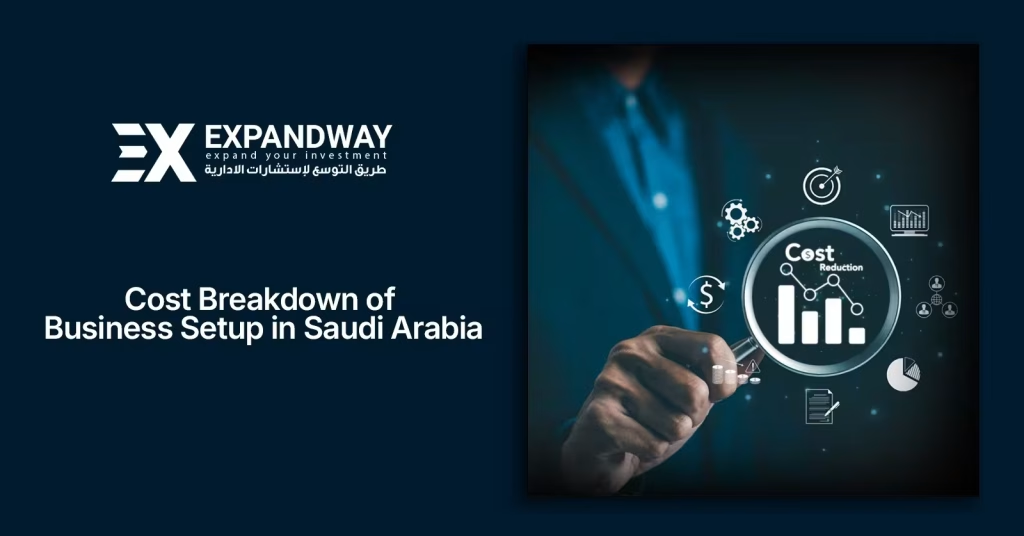Business setup in Saudi Arabia offers significant opportunities for entrepreneurs. With a booming economy and a government committed to diversifying its industries, the kingdom attracts global investors. However, understanding the cost breakdown is essential to plan effectively, avoid unexpected expenses, and ensure long-term profitability. Entrepreneurs must carefully assess all aspects of the setup process to create a sustainable and thriving business in this growing market.
- Initial Registration Fees for Business Setup in Saudi Arabia
- Legal and Consulting Fees
- Office Space Costs
- Licensing and Permits for Business Setup in Saudi Arabia
- Visa and Work Permits
- Saudization Requirements
- Utilities and Technology Setup
- Marketing and Branding
- Employee Salaries and Benefits
- Taxation Costs
- Business Expansion and Miscellaneous Costs
- Total Estimated Costs
- Tips to Reduce Costs
- Conclusion: Business Setup in Saudi Arabia
Initial Registration Fees for Business Setup in Saudi Arabia
The first step to setting up a business is registering your company. Company registration fees vary depending on the type of business entity you choose to establish. For example, sole proprietorships typically have lower fees compared to joint-stock companies or partnerships. These costs usually range from SAR 500 to SAR 2,000 and include the issuance of your commercial registration certificate. Additionally, there may be charges for name reservation, notarization, and document attestation, which could further add to the initial expenses. Having a clear understanding of these costs will help you allocate your resources more efficiently.
Legal and Consulting Fees
Legal support is crucial during the process of business setup in Saudi Arabia. Navigating the local regulatory landscape can be complex, especially for foreign investors unfamiliar with the country’s laws. Hiring experienced legal consultants ensures compliance with all necessary regulations, reducing the risk of penalties. Legal fees may range from SAR 10,000 to SAR 25,000, depending on the scope of work and the complexity of your business structure. Consulting fees, on the other hand, can vary widely and depend on the firm’s expertise and the specific services they offer. These services may include drafting contracts, registering trademarks, or securing licenses, making them an essential investment for long-term success.
Expandway is the leading Business consultant in Saudi Arabia, helping numerous businesses grow from the ground up. With over 10 years of experience in business consultancy and corporate services in Saudi Arabia, and having served over 200 clients worldwide, Expandway ensures a hassle-free transition from business setup to company formation. They can also assist in securing the required licenses in KSA, making them a trusted partner in your business journey.
Office Space Costs
Securing office space is another critical cost for any business. Office rental prices in major cities like Riyadh, Jeddah, or Dammam tend to be significantly higher compared to smaller cities or industrial zones. Average monthly rental costs range from SAR 3,000 to SAR 10,000, depending on factors such as location, size, and amenities. Premium locations in business districts naturally come with a higher price tag, while co-working spaces and shared offices offer a more affordable alternative for startups and small businesses. In addition to rent, businesses must also consider furnishing and utility costs, which can add another SAR 5,000 to SAR 20,000 to the total expenditure.
Licensing and Permits for Business Setup in Saudi Arabia
Specific industries in Saudi Arabia require additional licensing and permits to operate. These industries include food services, healthcare, construction, and education, among others. Licensing costs vary widely but typically start at SAR 5,000 and can go much higher depending on the sector. For instance, licenses for industries with stringent regulatory requirements, such as pharmaceuticals or manufacturing, may incur significant fees. Some permits require periodic renewals, adding recurring costs to your budget. Additionally, delays in obtaining the necessary approvals can lead to further financial and operational setbacks, making early planning and professional assistance essential.
Visa and Work Permits
Employing foreign workers in Saudi Arabia involves a range of visa and permit costs. The fee for a single work visa can reach up to SAR 7,000, depending on the worker’s nationality and role. Employers are also responsible for obtaining residency permits, known as Iqamas, which cost approximately SAR 650 per employee annually. These permits must be renewed annually, adding ongoing expenses to your payroll budget. Additional costs may include medical examinations, insurance, and visa processing fees, all of which are necessary for legal compliance. Ensuring that all documentation is accurate and up to date helps avoid fines and operational disruptions.
Saudization Requirements
The Saudi government mandates Saudization, or Nitaqat, for businesses operating within the kingdom. This policy requires companies to hire a certain percentage of Saudi nationals, with the quota varying by industry and company size. Compliance with Saudization often involves additional costs, such as providing training programs, offering competitive salaries, and investing in employee development initiatives. Non-compliance can result in penalties, restrictions on visa issuance, and other operational challenges. While meeting these requirements may increase initial expenses, it also contributes to the kingdom’s vision of a more inclusive and diversified economy.
Utilities and Technology Setup
Utilities, including electricity, water, and internet, are essential operational costs for any business. Monthly expenses for these utilities typically range between SAR 1,000 and SAR 3,000, depending on usage and location. Setting up a reliable technology infrastructure is equally important, as it supports daily operations and customer interactions. Initial costs for purchasing computers, software, and other necessary equipment can range from SAR 10,000 to SAR 30,000. Businesses must also budget for ongoing expenses such as software subscriptions, IT support, and equipment maintenance to ensure seamless operations.
Marketing and Branding
Launching a new business in Saudi Arabia requires a well-planned marketing and branding strategy to establish your presence in the market. Branding costs typically include logo design, website creation, social media management, and digital marketing campaigns. These expenses can range from SAR 10,000 to SAR 50,000, depending on the scale and complexity of your strategy. Traditional marketing methods, such as print advertisements or event sponsorships, may also add to your costs. Investing in a strong marketing plan not only helps attract customers but also builds brand recognition and loyalty over time, ensuring sustainable growth.
Employee Salaries and Benefits
Staff salaries represent a significant recurring expense for businesses in Saudi Arabia. Entry-level positions typically start at SAR 3,000 per month, while managerial roles can command salaries of SAR 15,000 or more. In addition to salaries, employers must provide benefits such as healthcare, housing allowances, and transportation. These additional perks are often required by law or expected by employees, further increasing payroll expenses. Companies must also consider end-of-service benefits and performance bonuses, which can add a substantial amount to their long-term financial obligations.
Taxation Costs
Saudi Arabia implemented a value-added tax (VAT) of 15% in 2020, which businesses must account for in their budgets. This tax applies to most goods and services, affecting both operational costs and pricing strategies. Additionally, Zakat, a religious tax, applies to certain businesses based on their profit margins and asset values. Managing these tax obligations requires professional accounting services to ensure compliance and accurate reporting. Hiring qualified accountants or financial consultants can help businesses navigate these requirements effectively and avoid penalties for non-compliance.
Business Expansion and Miscellaneous Costs
As your business grows, additional expansion costs will arise. These may include hiring more staff, upgrading equipment, or leasing larger office spaces to accommodate your operations. Expansion often necessitates further investments in marketing, technology, and training to scale effectively. Miscellaneous costs, such as legal compliance updates, insurance premiums, and unexpected expenses, should also be factored into your budget. Planning for these eventualities helps ensure financial stability and supports sustainable growth as your business evolves.
Total Estimated Costs
The overall cost of setting up a business in Saudi Arabia varies widely depending on the scale and type of operations. For small businesses, expect to invest between SAR 100,000 and SAR 300,000 initially. Larger businesses, especially those in highly regulated industries, may require upwards of SAR 1 million. Understanding these costs and planning accordingly allows entrepreneurs to allocate resources effectively and mitigate financial risks. Having a clear financial roadmap is crucial for achieving long-term success in the Saudi market.
Tips to Reduce Costs
- Choose cost-effective office spaces: Consider shared or co-working spaces to save on rental costs.
- Streamline legal processes: Work with experienced consultants to avoid errors and reduce delays.
- Leverage digital marketing: Focus on online strategies to minimize traditional advertising expenses.
- Plan for scalability: Invest in scalable technology solutions to accommodate future growth without incurring excessive costs.
Conclusion: Business Setup in Saudi Arabia
Understanding the cost breakdown of setting up a business in Saudi Arabia is crucial for achieving success in this dynamic market. Proper planning ensures smoother operations, financial stability, and compliance with all legal and regulatory requirements. By carefully considering all expenses, entrepreneurs can seize the opportunities this rapidly growing economy offers and build a sustainable, profitable business.


